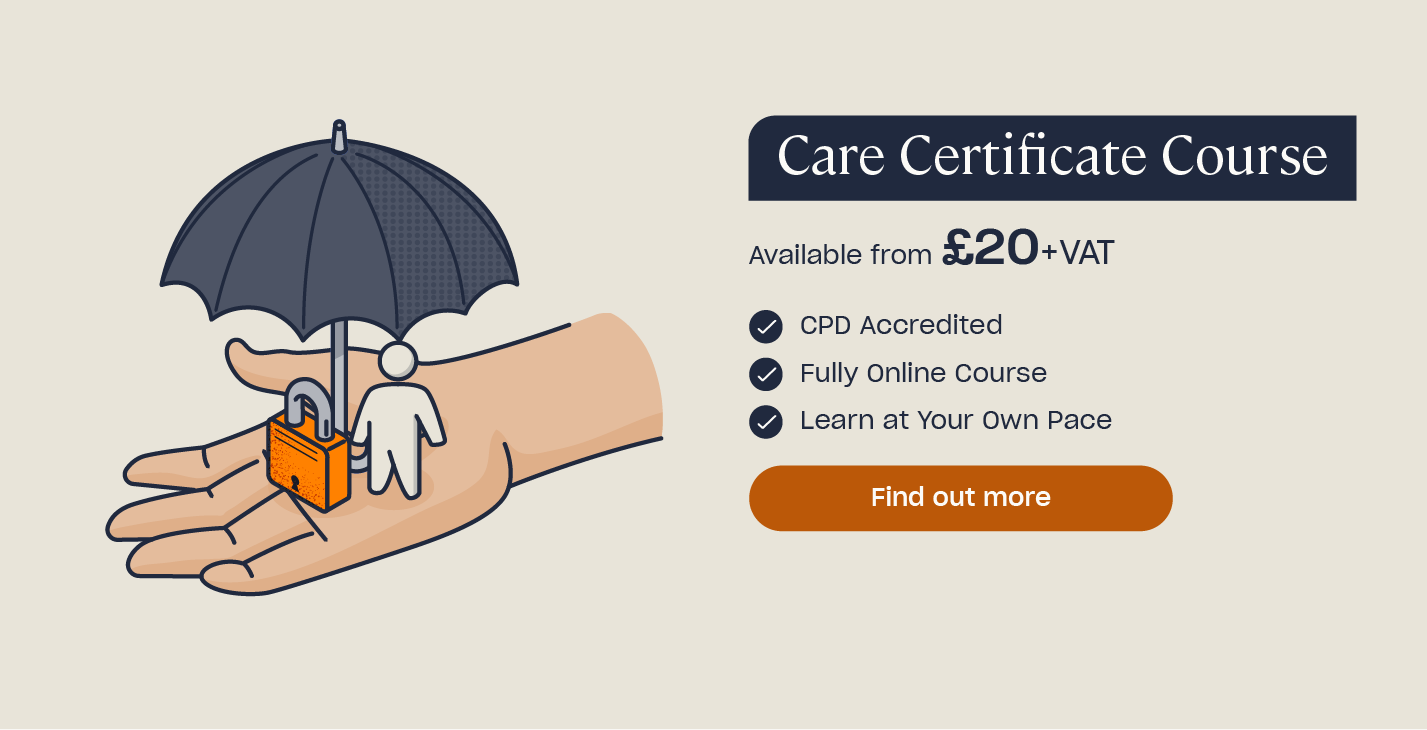How to Combat Dehydration in Health and Social Care
Dehydration can occur in varying degrees, often categorised as mild, moderate or severe. You will likely have noticeably suffered from it yourself at one time or another, perhaps after excessively sweating on a hot day or after one too many drinks. If you lose more water from your body than you take in, you will become dehydrated.
Within the health and social care sector, dehydration can have a severe impact, not only on those requiring care and those providing it but on the sector as a whole. This article will look into who it affects, how and the ways it can be recognised and prevented, as well as looking at some of the new technologies being developed to help keep track of people’s fluid intake.
What is Dehydration?
Dehydration can be defined as a harmful reduction in the amount of water in the body. This creates an electrolyte (mineral) imbalance, leaving the body unable to carry out its normal functions effectively. If left untreated, dehydration can become a very serious problem. It is one of the most common, preventable conditions known and many of us will walk around in a semi-permanent state of mild dehydration without even realising.
We really start to take note of dehydration when it occurs in those most susceptible members of society, such as infants, children and the elderly. The elderly in particular make up a large proportion of those relying on health and social care services, whether they reside in care homes, receive home care, are admitted to hospital or require additional medical or therapeutic services due to conditions associated with their age.
The impact of dehydration can be quite far-reaching and it can be responsible for additional strain on our health and social care systems. Dehydration, particularly in the elderly, often leads to complications requiring hospital admissions or additional medical treatment and care needs. Common examples include falls due to dizziness, a decrease in blood pressure, more susceptibility to viruses, constipation, urinary tract infections and associated symptoms such as confusion and acute kidney infections.

What are the Causes of Dehydration?
We know dehydration is caused by not drinking enough fluids for our body’s needs or losing more than we take in, creating an imbalance that has many consequences for our health and wellbeing. But what other factors impact the likelihood of us becoming dehydrated?
As we age, the percentage of water in our bodies naturally decreases, making it much easier to become dehydrated. Add to this the fact that the elderly have diminished thirst receptors, are more likely to have a reduced appetite, underlying medical conditions, regular medications and cognitive issues such as dementia, and it becomes clearer why those advanced in age are so susceptible to dehydration.
Many of those utilising health and social care services may be dealing with some degree of ill-health. Suffering from vomiting, diarrhea, excess sweating, diabetes, cystic fibrosis and kidney disease are just a few conditions that can increase the risk of becoming dehydrated. Certain medications, particularly diuretics and some blood pressure medications can also increase the risk of dehydration, mainly because they increase the need to urinate. This makes fluid management especially important within the sector.
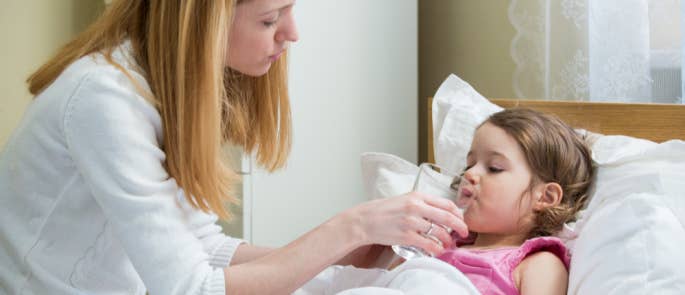
Dehydration can also be more prevalent in infants and children, owing to the fact their bodies have a higher proportion of water. They have a higher metabolic rate (their bodies use more water) than adults and as their immune system is not fully developed they are more likely to catch illnesses that lead to dehydration, such as diarrhoea and vomiting.
We have discussed a few of the conditions that can increase the risk of becoming dehydrated, but what are some of the factors that cause someone to reduce their fluid intake? Understanding these factors allows us to help struggling individuals increase how much they drink and therefore help prevent dehydration from occurring.
One cause that can affect infants, children and many adults is relying on someone else to provide them with fluids or indeed relying on them to encourage, remind or physically support them to drink. This can be due to disability, ill-health, cognitive impairment, mobility issues or the obvious inability of the young. When this support is required in a busy or understaffed environment such as a care home or hospital, there is increased risk of their hydration needs not being met.
Many elderly people admit to purposefully drinking less due to incontinence issues – the physical struggle or discomfort of using the bathroom or being afraid of being a burden on those responsible for helping them, such as a care worker or family member. When a person requires adaptations such as thickened fluids, a straw or a lidded beaker, some often see this as childish or undignified and refuse the offerings entirely. Disliking the texture and taste of thickened fluids (used for swallowing difficulties, for example following a stroke) can also discourage adequate fluid intake.
Issues with communication can also cause a person to go with less fluids if they are unable to communicate their needs, whether it’s that they feel thirsty, they are struggling to hold their drink, they frequently spill or are unable to pour themselves a drink from a jug due to its weight. There are many contributing factors that impact on how much fluid a person is able to access or drink.
This also applies not only to those utilising health and social care services, but also those providing it. Care workers can often become dehydrated during busy and long shifts – there can be increased physical activity, they are short of time or distracted, etc.
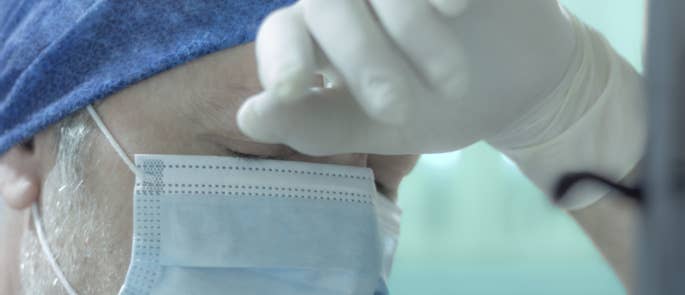
What are the Symptoms of Dehydration in Adults?
It is worth considering that many of the reasons that hinder a person’s fluid intake can also apply to their food intake and therefore poor nutrition (malnutrition) can often run alongside poor hydration (dehydration).
Some signs and symptoms of dehydration in adults, described by the NHS are:
- Feeling thirsty.
- Dark yellow and strong smelling urine.
- Feeling dizzy or lightheaded.
- Feeling tired.
- Headache.
- Confusion.
- A dry mouth, lips and eyes.
- Constipation.
- Urinating small amounts and fewer than four times a day.
Some signs and symptoms of malnutrition in adults, described by the NHS are:
- Unintentional weight loss.
- Reduced appetite.
- Lack of interest in food and drink.
- Feeling tired all the time.
- Feeling weaker.
- Getting ill often and taking a long time to recover.
- Wounds taking a long time to heal.
- Poor concentration.
- Feeling cold most of the time.
- Low mood or depression.
Bear in mind the symptoms for children under five can be slightly different to that of adults and require treatment to be sought quickly.
Some signs and symptoms of dehydration in children, described by the NHS are:
- They seem drowsy.
- Fast breathing.
- Have few or no tears when they cry.
- Have a soft spot on their head that sinks inwards (sunken fontanelle).
- Have a dry mouth.
- Have dark yellow urine or have not urinated in the last 12 hours.
- Have cold and blotchy-looking hands and feet.
Some signs and symptoms of malnutrition in children, described by the NHS are:
- Not growing or putting on weight at the expected rate.
- Behaviour changes, such as being unusually irritable, slow or anxious.
- Low energy levels and tiring more easily than other children.
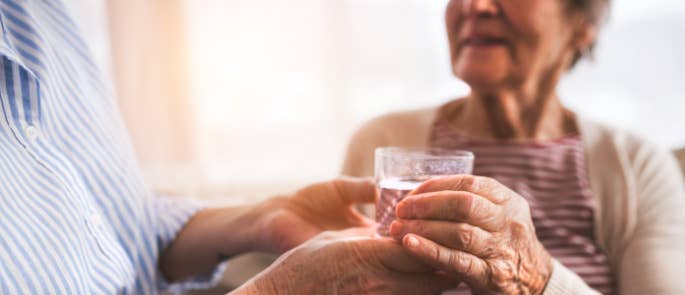
Understanding how to recognise dehydration means it can be addressed and treated before it leads to further or more serious complications. Whilst many of the above signs and symptoms can be enough to recognise dehydration, blood tests can also help confirm a diagnosis, particularly in more severe cases. They look at several factors, such as electrolyte levels (particularly sodium and potassium) and how well the kidneys are functioning. Urine tests can also help show if and how severely a person is dehydrated.
The importance of fluids and nutrition makes up an integral part of the Care Certificate. The certificate lays out the standards that define the knowledge, skills and behaviours expected of those working within the health and social care sector. It should be part of a care worker’s induction process. If you are new to care or wish to learn more, check out our online Care Certificate course.
Dealing with Dehydration
As it occurs so commonly there are many sources of advice available on the subject and a variety of products to help combat dehydration. The easiest and most obvious way to rectify it, is to drink more fluids. If additional support is required, a pharmacist can advise on any rehydration products that may be suitable. These are designed to help replace lost electrolytes and sugars. The correct treatment for someone suffering from dehydration depends on several factors, including the severity, the individual’s medical conditions and any circumstance that may prevent them from taking in the required fluids.
In a health and social care setting, if anyone in your care displays possible symptoms of dehydration, always follow your organisation’s policies and procedures to record and report your concern. Many patients and service users who are assessed and deemed at risk of dehydration or malnourishment often require specific records to be kept to monitor their intake. In some cases you may also be required to monitor their urine output.
Looking for a Course?
To learn more about the ways people receiving health and social care should be safeguarded, why not check our Safeguarding Courses?
It may be appropriate to provide someone with initial support whilst you wait for pharmaceutical or medical help. This could help reduce the risk of dehydration becoming worse and help the individual recover. You may find these initial steps helpful:
- If the person is out in the heat and sun, bring them into the shade.
- Encourage fluids – if they do not feel like drinking then try small sips to begin with.
- Try to give them food with a high water content, such as melon, cucumber, strawberries or an orange.
- Use a damp towel or cloth to dampen their face.
- Make sure they do not exert themselves and they take rest.
Some help may not be appropriate. If the individual has specific requirements that prevent you giving certains foods and fluids, seek additional support from your supervisor, the GP or 111. Remember if someone presents as acutely unwell then call for emergency medical attention on 999 or 112.
It can be difficult to deal with dehydration when connected to viral infections. Being dehydrated makes it harder for your body to work as efficiently to fight off a virus and the virus itself can make it harder to remain hydrated due to the symptoms it creates, such as a high temperature, coughing, loss of appetite or vomiting etc.
Many studies are now looking to confirm links between severely ill patients with COVID-19 and electrolyte imbalance, for example which precedes the other, how they impact each other and how it affects patient management and outcomes. Therefore it seems wise that prevention will always be the most reliable means of dealing with dehydration.
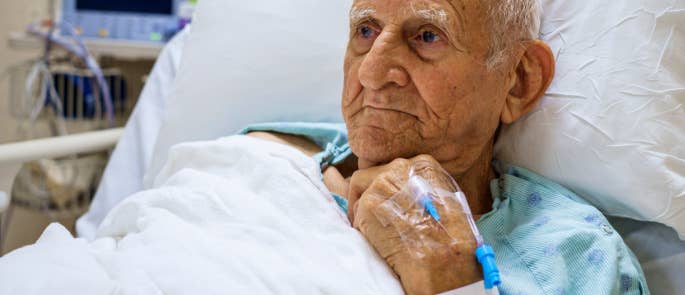
How to Prevent Dehydration
If you work within the health and social care sector and have a responsibility for patients or service users within your work setting, you have a duty of care. This means you must promote their wellbeing, safety and welfare through good practice, preventing any emotional, personal or physical harm. If a person is not provided with appropriate fluids and the time and support required to drink them, this is poor practice.
Whilst most cases of dehydration are fully treatable, is it also preventable. Prevention should be a priority for us all, particularly within health and social care settings. Whilst there will need to be adaptations to the general rules of preventing dehydration depending on a person’s age or medical conditions, here is some general advice:
- Drink regularly throughout the day. Two litres or approximately six to eight glasses of water a day is recommended by NHS England.
- Food can actually make up around 20% of your daily fluid intake, so opt for some food with a high water content, such as cucumber or melon.
- Juice, tea and coffee all count toward your fluid intake. Try to avoid high levels of alcohol.
- Drink more if you are experiencing things that could make you lose additional fluids, such as vomiting or diarrhea, exposure to hot weather or if you have been excessively sweating, perhaps after exercise.
- Always drink when thirsty
- Keep an eye on your urine colour, if you notice it getting darker in colour or it begins to smell, increase your fluid intake.
- Keep a water bottle or perhaps a jug to hand to prompt you to drink.
- Set alarms as reminders.
How to Prevent Dehydration in the Elderly
Preventing dehydration in the elderly may require a slightly different approach than in a young, fit, fully independent individual. It may be a case of needing to eliminate some of the barriers they face that prevents them from accessing adequate fluids.
Some of the general suggestions for prevention will apply, but a few things to consider to prevent dehydration in the elderly are:
- Encourage them to drink small amounts more often rather than expecting them to drink large amounts at once.
- Offer them the drinks they prefer, not just water.
- Perhaps offer them drinks on a schedule or encourage fluids to be taken with every meal.
- Address any urinary incontinence issues that may be causing their reluctance to drink more.
- Offer them more water-based foods to help increase their water intake.
- Consult with others such as doctors, nurses, dentists to see if there are underlying issues or additional support they can offer. There can often be liquid nutritional supplements prescribed for those who struggle to eat and drink adequately.
- Talk to them where possible and ensure they have been fully assessed to identify any barriers to eating and drinking.
- Closely monitor their fluid and nutritional intake.
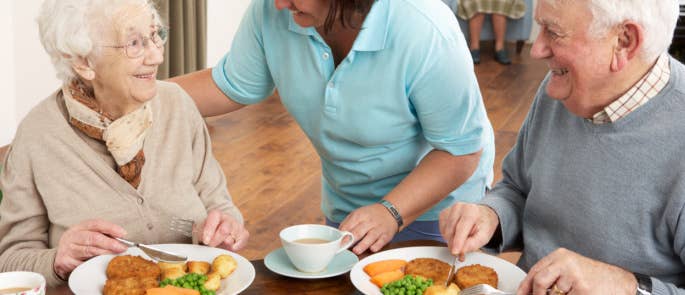
How to Promote Adequate Nutrition and Hydration
As a health and social care organisation or worker, promoting adequate nutrition and hydration is paramount for quality care and is one of the core care standards that must be met. Maintaining adequate nutrition and hydration can help prevent certain diseases, reduce hospital admissions, improve wound healing, help manage weight and boost energy and wellbeing. It can be a large factor in helping someone maintain their quality of life and health. A few ways to promote adequate nutrition and hydration are:
- Make sure their diet is balanced with appropriate amounts of carbohydrates, proteins, fibre, vitamins and minerals.
- Provide food and fluids in a person-centred way. Consider their likes, dislikes and preferences.
- Have their individual needs been met? Do they require softer food or help to cut food up or open packaging?
- Make sure they have any specialised equipment to aid them, such as non-slip mats to hold plates in place, specialised cutlery, a handled cup or a straw.
- Do they have their teeth in and do they fit securely and are comfortable to eat with?
- Do they need to be physically fed or assisted to be fed in order to eat? This may be due to physical or cognitive impairments.
- Are there any foods they shouldn’t eat due to medical conditions or medications, for example should they avoid salt due to high blood pressure, or grapefruit due to statins?
- Always treat the individual with dignity and respect, give them the time to eat and drink and do not rush them.
- Ensure all care workers are trained in appropriate methods to help feed someone.
- Always work in-line with their care plan and their assessed needs.
- If you have any concerns at all that someone is not eating or drinking enough, they are struggling in some way or you notice there are certain things they avoid, always record and report this feedback to allow a further assessment of their needs and requirements.
- Some companies are now producing innovative ways to help increase water intake in those that struggle, for example sugar free jelly treats that are made up of a very high water content.
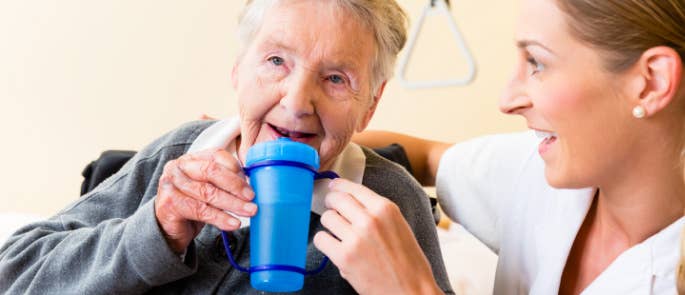
New Methods for Monitoring Hydration
We have discussed the importance of hydration, the role it plays in good health and how closely monitoring a person’s intake can help prevent the onset of dehydration. Human factors can impact inaccuracy in manual monitoring systems. This may be because of the busyness of staff, poor staffing levels, shift changes, forgetting to note intake regularly, topping up someone’s fluid without recording it, etc.
Smart cups are a new method to help combat inaccuracies in recording and come in several forms. Some use a smartwatch and cup combination, which allows how often the individual drinks to be tracked, with the information being uploaded to view on a relevant app. Others have a base the cup sits on which monitors how much fluid has been taken.
These various new technologies are all slightly different and competition seems to be growing. As yet, they have not yet been universally adopted throughout the health and social care sector, with the majority still using manual methods. They are however worth keeping informed about and for those caring for a loved one at home, there are increasing numbers of hydration trackers available to the general public that may help monitor their intake when you are not around.
Understanding how to combat dehydration requires those within the health and social care sector to work together to help promote good practices and adopt person-centered approaches to help prevent dehydration throughout the sector. Knowing how to help treat dehydration is important but prevention is even more so.
Further Resources:
- What is the Care Certificate?
- Urinary Tract Infections in the Elderly: A Guide for Healthcare Professionals
- How to Promote Oral Health Care in Care Homes
- Nutrition and Healthy Eating Training Course
- Care Certificate Course
- Malnutrition in the Elderly


